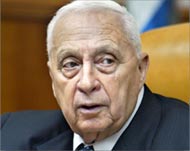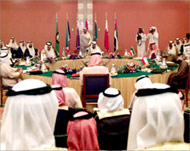Gulf states urge progress on Palestine
Leaders of the Gulf Cooperation Council have urged US President George Bush to forge ahead with the creation of an independent Palestinian state.

Gulf leaders said in a resolution at the close of their annual summit in the Bahraini capital Manama that Bush should support the Middle East peace process.
The draft resolution said absolute priority should be given to the Middle East conflict “so as to honour the commitments and promises to establish a viable Palestinian state (which can) coexist in peace and security with the state of Israel”.
Member states Bahrain, Kuwait, Oman, Qatar, Saudi Arabia and the UAE called for relaunching the peace process on the basis of the road map and a Saudi-inspired initiative adopted in 2001 at an Arab summit in Beirut.
The Saudi plan offers Israel normal ties with the Arab world in return for its withdrawal from all the territories captured in the 1967 Arab-Israeli war.
The road map for Middle East peace calls for setting up a Palestinian state by 2005.
The Gulf Cooperation Council (GCC) resolution also calls for making the Middle East, including the Gulf region, an area free of weapons of mass destruction, and requested that Israeli nuclear installations be subject to the control of the International Atomic Energy Agency.
Second term
The conference also decided that Abd al-Rahman al-Attiyah, a Qatari minister of state, is to serve as GCC secretary-general for another three-year term, an official said.
 |
|
The GCC has called for Israel to |
“Al-Attiyah’s mandate was renewed for three years,” the official said as Gulf leaders held the second and final day of their annual meeting.
Al-Attiyah’s new mandate begins on 1 April 2005.
Al-Attiyah is the fourth secretary-general of the GCC since it was created in 1981. Kuwaiti Abd Allah Bishara held the post for 12 years before it was handed over to Emirati Fahim al-Qasimi then Saudi Jamil al-Hujailan.
Aljazeera’s correspondent in Bahrain, Ali al-Dhufairi, said the six-nation bloc also created the post of assistant secretary- general for security affairs, and Bahrain nominated Brigadier Muhammad Fadil al-Nuaimi for the post.
Al-Nuaimi will also take office in April 2005.
Aljazeera’s correspondent, al-Dhufairi reported that Iraq and Palestine were among the issues tabled at the summit.
Unresolved dispute
“The final statement contains the same points usually discussed at GCC summits, namely; supporting the Palestinian case, calling on the US and international community to firmly support the peace process, and concentrating on Palestinians having the right to elect their leadership,” he said.
 |
|
Palestinian and Iraqi elections |
“The final statement also discusses Iraq‘s unity and security with the participation of all Iraqi parties in the upcoming elections and the development of a new Iraq,” he added.
“The issue of the three islands of the United Arab Emirates (UAE) was also dealt with,” the correspondent said. “The GCC summit backs the right of the UAE in these islands, and calls on Iran to hold negotiations on this issue,” he said.
However, a row between Bahrain and Saudi Arabia, which opted to withhold its Crown Prince Abd Allah from the talks in a gesture of disapproval, remained unresolved.
“The final statement does not mention the Saudi-Bahraini dispute over the free trade agreement signed by Bahrain and the United States,” said al-Dhufairi. “This means the dispute has not been resolved yet.”